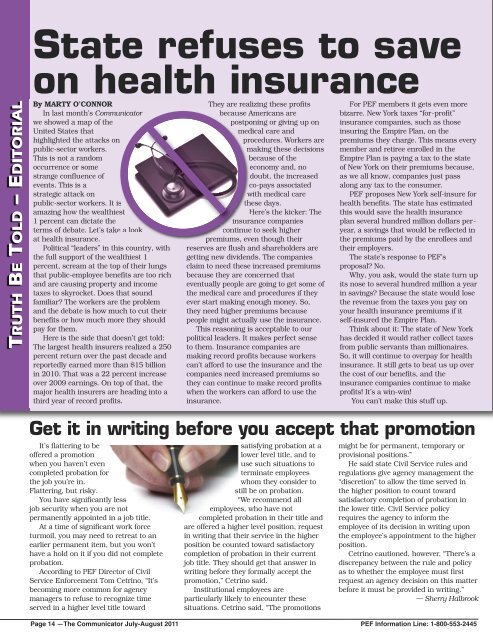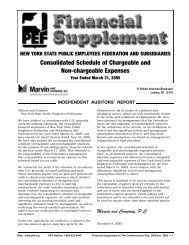s - TheCommunicator.org
s - TheCommunicator.org
s - TheCommunicator.org
- No tags were found...
You also want an ePaper? Increase the reach of your titles
YUMPU automatically turns print PDFs into web optimized ePapers that Google loves.
State refuses to saveon health insuranceTRUTH BE TOLD – EDITORIALBy MARTY O’CONNORIn last month’s Communicatorwe showed a map of theUnited States thathighlighted the attacks onpublic-sector workers.This is not a randomoccurrence or somestrange confluence ofevents. This is astrategic attack onpublic-sector workers. It isamazing how the wealthiest1 percent can dictate theterms of debate. Let’s take a lookat health insurance.Political “leaders” in this country, withthe full support of the wealthiest 1percent, scream at the top of their lungsthat public-employee benefits are too richand are causing property and incometaxes to skyrocket. Does that soundfamiliar? The workers are the problemand the debate is how much to cut theirbenefits or how much more they shouldpay for them.Here is the side that doesn’t get told:The largest health insurers realized a 250percent return over the past decade andreportedly earned more than $15 billionin 2010. That was a 22 percent increaseover 2009 earnings. On top of that, themajor health insurers are heading into athird year of record profits.They are realizing these profitsbecause Americans arepostponing or giving up onmedical care andprocedures. Workers aremaking these decisionsbecause of theeconomy and, nodoubt, the increasedco-pays associatedwith medical carethese days.Here’s the kicker: Theinsurance companiescontinue to seek higherpremiums, even though theirreserves are flush and shareholders aregetting new dividends. The companiesclaim to need these increased premiumsbecause they are concerned thateventually people are going to get some ofthe medical care and procedures if theyever start making enough money. So,they need higher premiums becausepeople might actually use the insurance.This reasoning is acceptable to ourpolitical leaders. It makes perfect senseto them. Insurance companies aremaking record profits because workerscan’t afford to use the insurance and thecompanies need increased premiums sothey can continue to make record profitswhen the workers can afford to use theinsurance.For PEF members it gets even morebizarre. New York taxes “for-profit”insurance companies, such as thoseinsuring the Empire Plan, on thepremiums they charge. This means everymember and retiree enrolled in theEmpire Plan is paying a tax to the stateof New York on their premiums because,as we all know, companies just passalong any tax to the consumer.PEF proposes New York self-insure forhealth benefits. The state has estimatedthis would save the health insuranceplan several hundred million dollars peryear,a savings that would be reflected inthe premiums paid by the enrollees andtheir employers.The state’s response to PEF’sproposal? No.Why, you ask, would the state turn upits nose to several hundred million a yearin savings? Because the state would losethe revenue from the taxes you pay onyour health insurance premiums if itself-insured the Empire Plan.Think about it: The state of New Yorkhas decided it would rather collect taxesfrom public servants than millionaires.So, it will continue to overpay for healthinsurance. It still gets to beat us up overthe cost of our benefits, and theinsurance companies continue to makeprofits! It’s a win-win!You can’t make this stuff up.Get it in writing before you accept that promotionIt’s flattering to beoffered a promotionwhen you haven’t evencompleted probation forthe job you’re in.Flattering, but risky.You have significantly lessjob security when you are notpermanently appointed in a job title.At a time of significant work forceturmoil, you may need to retreat to anearlier permanent item, but you won’thave a hold on it if you did not completeprobation.According to PEF Director of CivilService Enforcement Tom Cetrino, “It’sbecoming more common for agencymanagers to refuse to recognize timeserved in a higher level title towardsatisfying probation at alower level title, and touse such situations toterminate employeeswhom they consider tostill be on probation.“We recommend allemployees, who have notcompleted probation in their title andare offered a higher level position, requestin writing that their service in the higherposition be counted toward satisfactorycompletion of probation in their currentjob title. They should get that answer inwriting before they formally accept thepromotion,” Cetrino said.Institutional employees areparticularly likely to encounter thesesituations. Cetrino said, “The promotionsmight be for permanent, temporary orprovisional positions.”He said state Civil Service rules andregulations give agency management the“discretion” to allow the time served inthe higher position to count towardsatisfactory completion of probation inthe lower title. Civil Service policyrequires the agency to inform theemployee of its decision in writing uponthe employee’s appointment to the higherposition.Cetrino cautioned, however, “There’s adiscrepancy between the rule and policyas to whether the employee must firstrequest an agency decision on this matterbefore it must be provided in writing.”— Sherry HalbrookPage 14 —The Communicator July-August 2011 PEF Information Line: 1-800-553-2445















